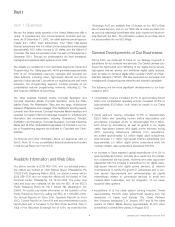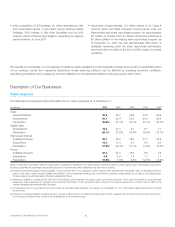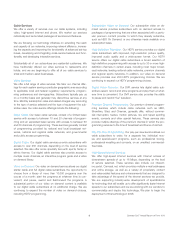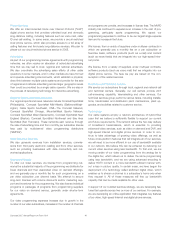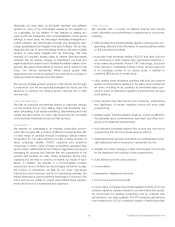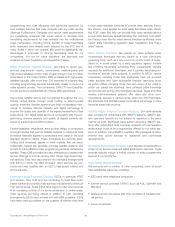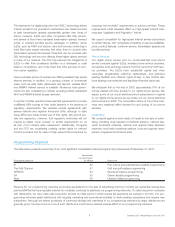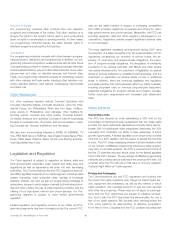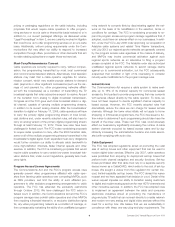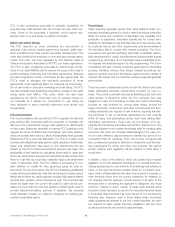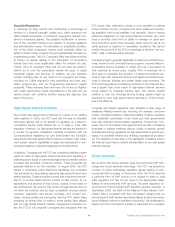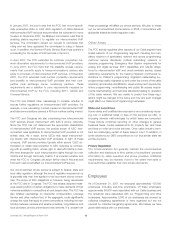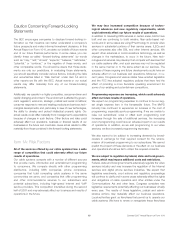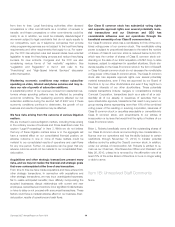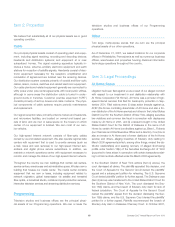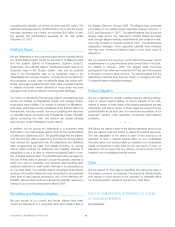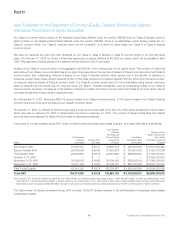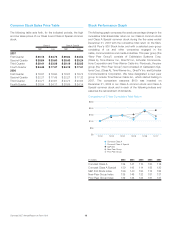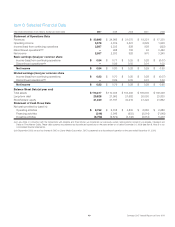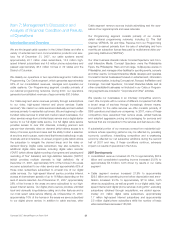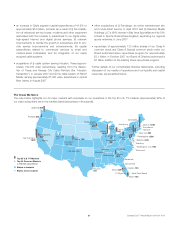Comcast 2007 Annual Report Download - page 13
Download and view the complete annual report
Please find page 13 of the 2007 Comcast annual report below. You can navigate through the pages in the report by either clicking on the pages listed below, or by using the keyword search tool below to find specific information within the annual report.
Copyright Regulation
In exchange for filing reports and contributing a percentage of
revenue to a federal copyright royalty pool, cable operators can
obtain blanket permission to retransmit copyrighted material con-
tained in broadcast signals. The possible modification or elimina-
tion of this copyright license is the subject of ongoing legislative
and administrative review. The elimination or substantial modifica-
tion of the cable compulsory license could adversely affect our
ability to obtain certain programming and substantially increase our
programming costs. The U.S. Copyright Office has issued a Notice
of Inquiry on issues relating to the calculation of compulsory
license fees that could significantly affect the amount we pay.
Further, the U.S. Copyright Office has not yet made any determi-
nations as to how the compulsory license will apply to digital
broadcast signals and services. In addition, we pay standard
industry licensing fees to use music in the programs we create,
including our Cable segment’s local advertising and local origi-
nation programming, and our Programming segment’s original
programs. These licensing fees have been the source of litigation
with music performance rights organizations in the past and we
cannot predict with certainty whether license fee disputes may
arise in the future.
High-Speed Internet Services
We provide high-speed Internet services by means of our existing
cable systems. In 2002, the FCC ruled that this was an interstate
information service that is not subject to regulation as a telecom-
munications service under federal law or to state or local utility
regulation. However, our high-speed Internet services are subject to
a number of regulatory obligations, including compliance with the
Communications Assistance for Law Enforcement Act (“CALEA”)
requirement that high-speed Internet service providers must imple-
ment certain network capabilities to assist law enforcement in con-
ducting surveillance of persons suspected of criminal activity.
In addition, Congress and the FCC are considering defining certain
rights for users of high-speed Internet services and regulating or
restricting some types of commercial agreements between service
providers and providers of Internet content. These proposals are
generally referred to as “net neutrality.” In August 2005, the FCC
issued a nonbinding policy statement identifying four principles
that will guide its policymaking regarding high-speed Internet and
related services. These principles provide that consumers are enti-
tled to: (i) access lawful Internet content of their choice; (ii) run
applications and services of their choice, subject to the needs of
law enforcement; (iii) connect their choice of legal devices that do
not harm the network; and (iv) enjoy competition among network
providers, application and service providers, and content pro-
viders. Several parties are advocating that the FCC adopt these
principles as formal rules. In addition, some parties have alleged
that our high-speed Internet network management practices vio-
late the FCC’s “net neutrality” principles and requested that the
FCC adopt rules, declaratory rulings or even penalties to change
these practices. Further, Congress and some states are consider-
ing legislation that would establish “net neutrality” rules or impose
additional obligations on high-speed Internet providers. Any such
rules or statutes could limit our ability to manage our cable sys-
tems (including use for other services), obtain value for use of our
cable systems or respond to competitive conditions. We cannot
predict the outcome of the FCC proceedings or whether “net neu-
trality” rules or statutes will be adopted.
A federal program generally applicable to telecommunications ser-
vices, known as the Universal Service program, requires telecom-
munications service providers to collect and pay a fee based on
their revenues (in recent years, roughly 10% of revenues) into a
fund used to subsidize the provision of telecommunications ser-
vices in high-cost areas and Internet and telecommunications ser-
vices to schools, libraries and certain health care providers. The
FCC and Congress are considering revisions to the Universal Ser-
vice program that could result in high-speed Internet services
being subject to Universal Service fees. We cannot predict
whether or how the Universal Service funding system might be
extended to cover high-speed Internet services or, if that occurs,
how it will affect us.
Congress and federal regulators have adopted a wide range of
measures affecting Internet use, including, for example, consumer
privacy, copyright protection, defamation liability, taxation, obscenity
and unsolicited commercial e-mail. State and local governments
have also adopted Internet-related regulations. Furthermore, Con-
gress, the FCC and certain local governments are also considering
proposals to impose customer service, quality of service, privacy
and standard pricing regulations on high-speed Internet service pro-
viders. It is uncertain whether any of these proposals will be adopt-
ed. The adoption of new laws or the application of existing laws to
the Internet could have a material adverse effect on our high-speed
Internet business.
Phone Services
We currently offer phone services using interconnected VoIP tech-
nology and circuit-switched technology. The FCC has adopted a
number of orders addressing regulatory issues relating to inter-
connected VoIP providers. In November 2004, the FCC ruled that
a particular form of VoIP service is not subject to state or local
utility regulation but has not yet ruled on the appropriate classi-
fication of interconnected VoIP services. The state regulatory en-
vironment for interconnected VoIP therefore remains uncertain. In
September 2006, the Staff of the Missouri Public Service Com-
mission filed a complaint with that commission alleging that our
interconnected VoIP service was being offered as telecommunica-
tions in Missouri without a certificate of authority. We challenged in
federal court the commission’s ability to adjudicate the complaint.
11 Comcast 2007 Annual Report on Form 10-K


